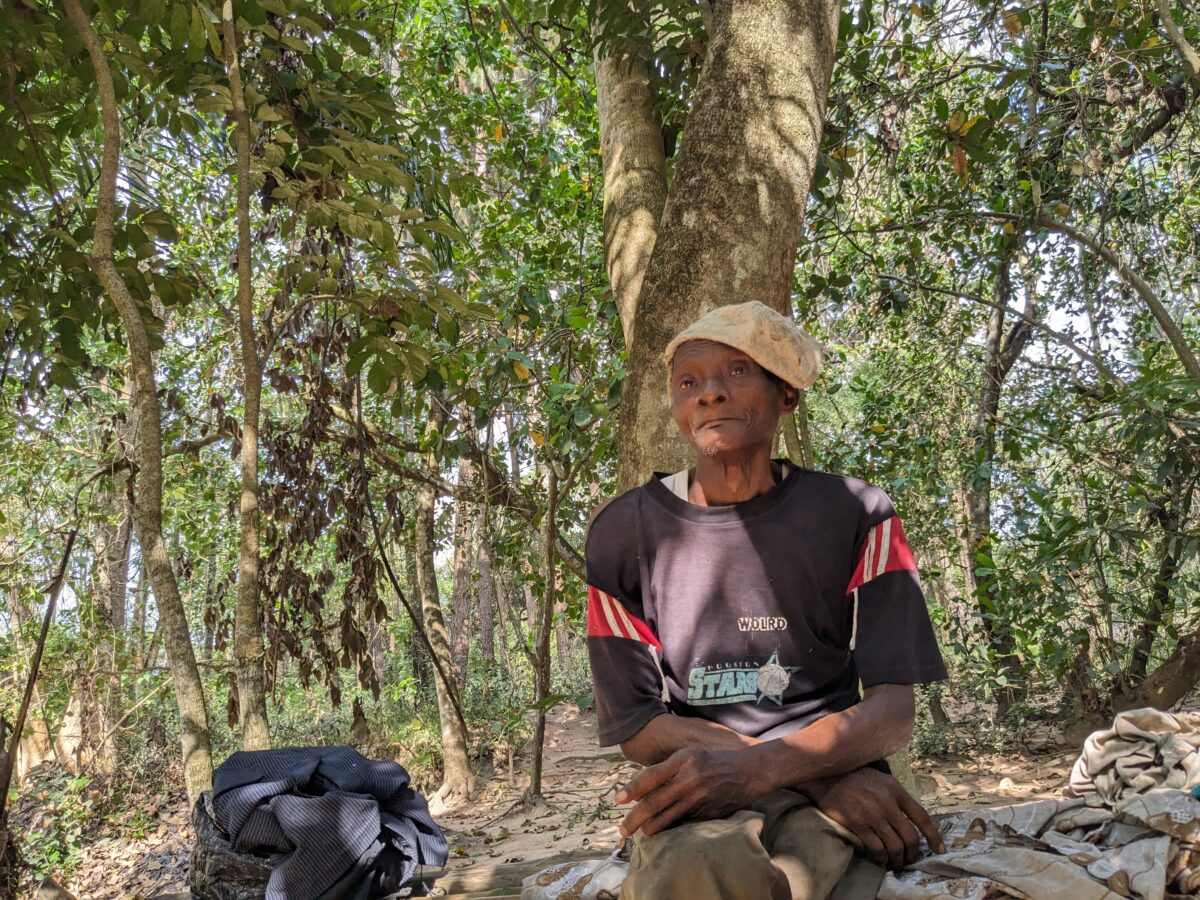It was around 5 pm on December 8, 2023, and Basiru Iromini was attempting to start a fireplace in order to cook some food. He was blowing into the hearth with his mouth, causing smoke to softly scatter into the air and sting his eyes. But he persisted.
This challenge was the reason Iromini’s wife left the forest to pick up some hot charcoal from a location where a smoked fish vendor was operating. Other vendors also set up shop near the forest boundary that connected Water Works Road to General Hospital Road in the Iwo Local Government area of Osun State.
Iromini failed to transform the hearth into fire, but the charcoal his wife stepped out to get was helpful. In the local language, a hearth is called ààrò, which consists of three hearthstones on which pots are placed to make food.
READ ALSO: SPECIAL REPORT: Built in 2021, a N190m Bookless National Library Sits in Osun Bush
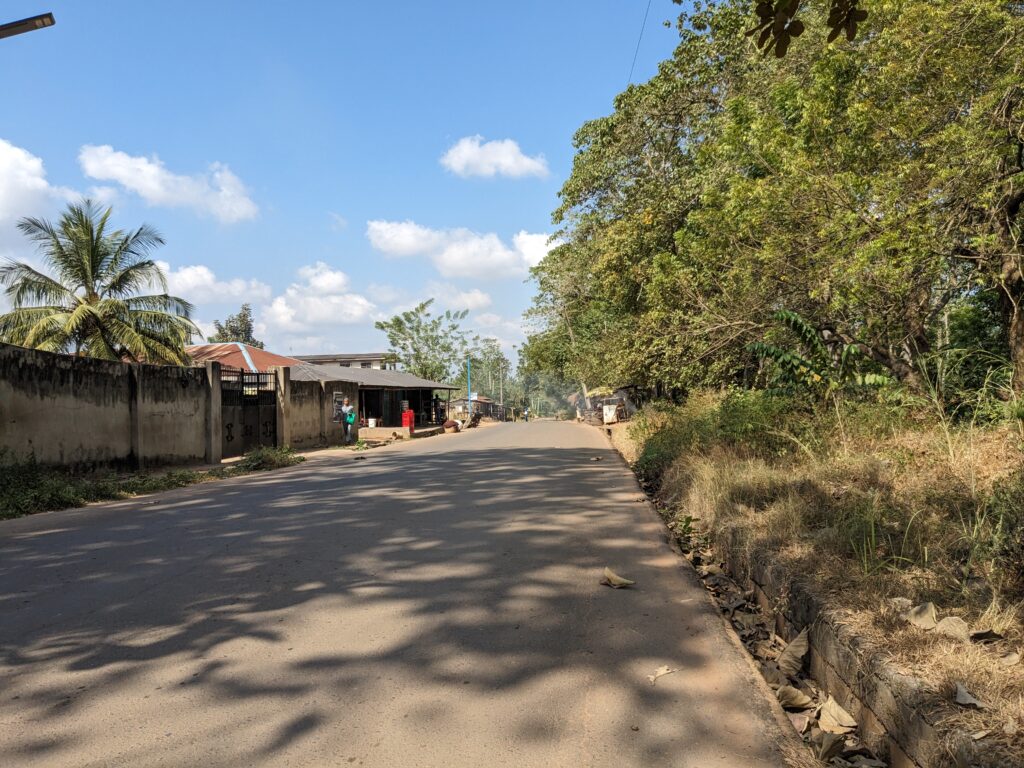
The vendors had voiced their concerns about Iromini’s safety when this reporter asked to enter the forest to see him.
“We cannot allow you to enter the forest. In this period, when we hear people being kidnapped every day, we have to be careful. Baba will pass through here when he’s going home. He will soon come out. If you really want to see him and you don’t have his phone number, you can wait for him here, but you cannot enter,” one of the female petty traders said without mincing words, and others nodded in affirmation.
Iromini told our reporter that he was too tired to take him on a tour of the forest and asked him to come early the next day. After our reporter left, he had to call Iromini and give the phone to one of the women so that she could talk to him and make sure nothing strange had happened to him while this reporter was with him.
NATURE’S WORKER
Over 40 years ago, the federal military government created rainforests in the country. In the Iwo Local Government Area of Osun State, one such forest was situated and staffed for proper management.
Iromini was one of the pioneer workers. Specifically, he joined the government service on July 15, 1983, as a forest guardian, watching over the forest situated along the Asabi-Okin road in the town. It was a job that required his commitment and knowledge of the environment as an indigenous person. The fact that the forest plantation was in his hometown made the job more enticing to him.
The 70-year-old guard explained that he was employed to work day shifts. Another man was employed on separate conditions to do night shifts. Along the line, however, the night guard left the job, leaving only him to do both shifts as the government failed to replace the man. But Iromini’s salary did not reflect the additional workload.
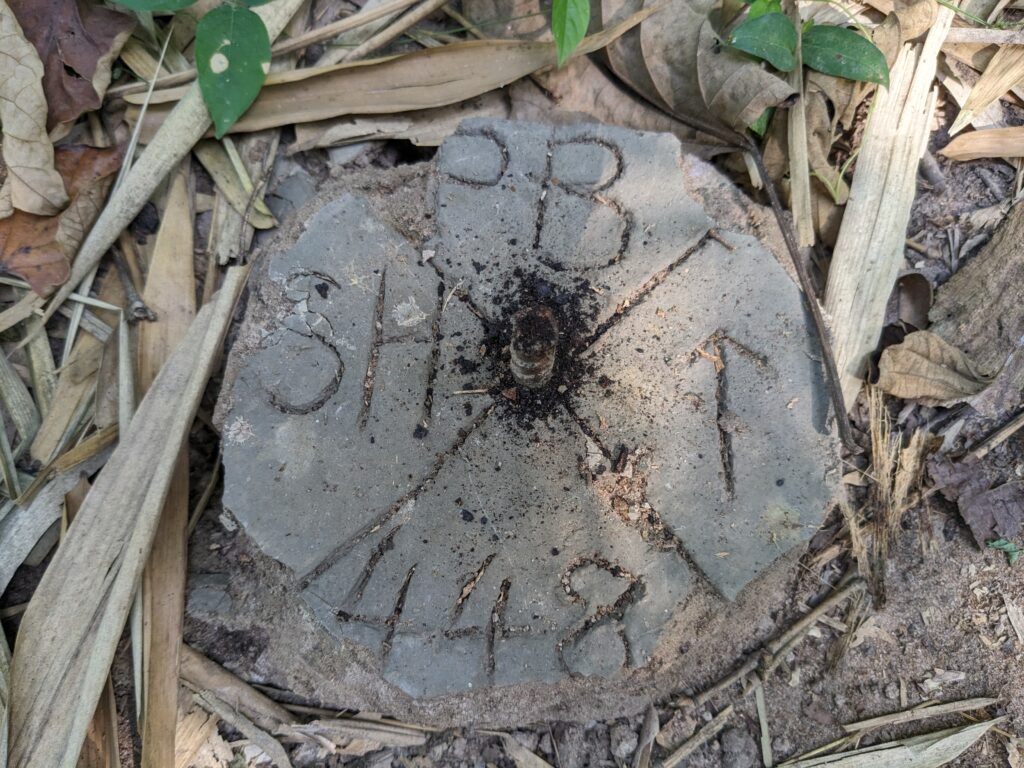
“I dropped the night shifts three years after I had unsuccessfully tried to get a pay raise from the ministry. I explained to my directors that I could not continue doing both shifts without a commensurate remuneration, but their response was that the government was not ready to employ a replacement and that I should forget the idea of getting an increased salary,” he said.
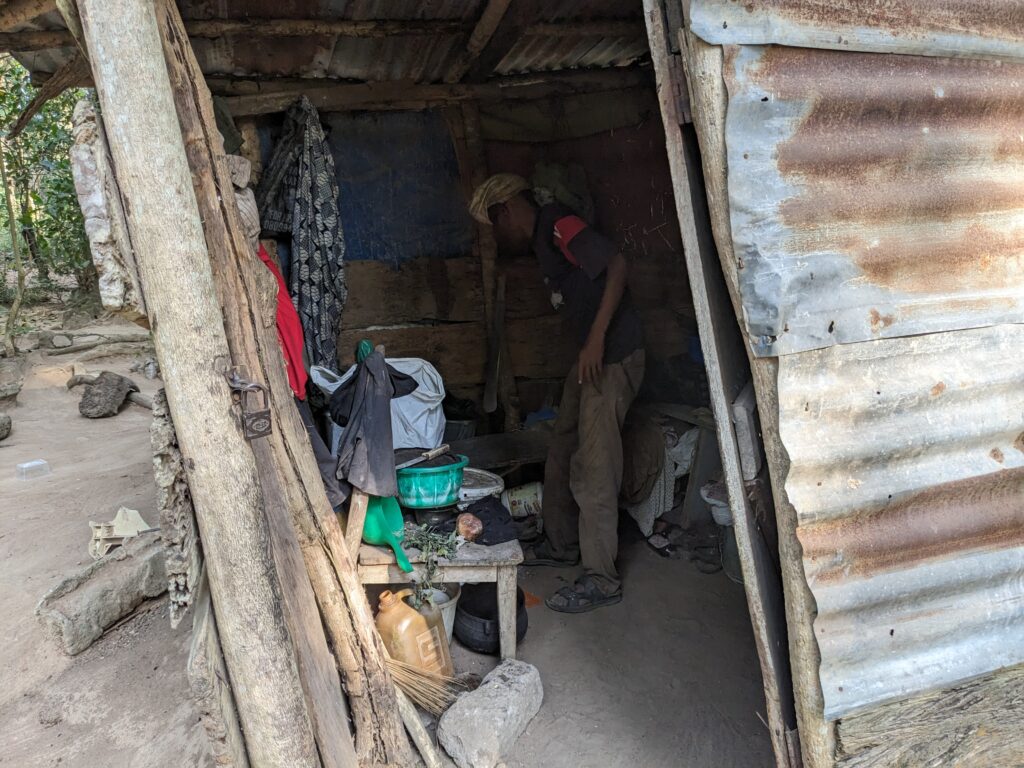
Even with the knowledge that he was not going to get a raise and a feeling of being unappreciated, Iromini continued working every day. However, the massive job cuts done by Oflusegun Obasanjo’s government in 2006 affected the guard. The government retired him, like several thousand others across the country. His salary had remained the same throughout his 23 years in service, and he had been on the same grade level.
After retirement and at a vulnerable age, he now earns less than N17,000 as a monthly pension. President Bola Tinubu announced N25,000 grants to federal pensioners in October 2023. As of December, Iromini had not been paid. He said his friends, who were also pensioners in the locality, were facing the same challenge.
“At some point, we were about 40 people working in the forest. Over time, some people died while others were sacked like me in 2006. But I was retained, although without any pay. I was promised a monthly salary, but I have never received a dime from the government,” Iromini explained.
A dilapidated structure stands in the forest. According to Iromini, the building, consisting of a few rooms and a large space, used to be a bubbling place housing forest workers. Painting a picture of those days as better and fun, he said the forest served as a community where there was as much diversity of people as the diversity of lush trees they were nurturing. He was nostalgic.
“When this building became dilapidated, I had to build a chalet for my own convenience. And the chalet has become a house for me. I spend most of my days there. I can sleep safely, and I don’t allow its surroundings to grow weeds. I prefer sleeping there to sleeping in the government house in Abuja,” Iromini said of his small chalet, adding that he went to Abuja for the first time in his life for a pensioner verification exercise and could not withstand the temperature of the air conditioners in the offices he entered.
Away from his normal work routines, Iromini would join other workers to plant trees and nurture them. But for him, many trees would have died and environmental criminals would have cut down trees illegally. In the forest, Iromini has a small primary farm from which he gets trees and transplants them within the forest.
WORK WITHOUT PAY
The sacking of Iromini meant that no one would be left on the plantation to carry on with his work. A director at the Federal Ministry of Environment’s Osun State office conveyed the management’s decision to keep him on the job, and he accepted the offer without hesitation, even though there was no official documentation to support the decision.

More than 16 years after, Iromini has not been paid a dime by the federal government. Even though the old man takes pride in being nature’s worker, the job does not put food on his table. He has now become a peasant farmer in the forest, cultivating a small portion of land, but the trees shield his crops from getting adequate sunlight.
According to Iromini, who has worked in the forest for 41 years, the plantation was made purely of teak trees until 2006, when some arsonists burned it and other forests down in Ife, Ife-Odan and Ikire in Osun State in order to cut down trees and commit other environmental crimes. He also explained that three families in the community donated the land for the forest. However, their descendants recently started encroaching on the land, claiming that the compensations paid to their forefathers had elapsed.
The official reaction to the arson was the planting of different species of trees that are now predominant in the vast forest today. During an interview, Iromini explained to FIJ that the forest was about 100 hectares wide. In this territory, he works like a lone ranger and it appears the government has forgotten him there.
“I am alone here. Government officials rarely come here except if they want to cut trees. Regardless, no official can say they have ever come here and met my absence. I am always around from morning to evening every day of the week. Aside from the salary starvation, I confront other challenges.
“For instance, some forest rangers illegally came here in 2022, saying they had a directive to come and cut some trees. I insisted on seeing their approval letter, but they could not produce any. I had to invite Olasupo Oyetoro Ladipo, a professor of agricultural economics, whose residence is close to the forest, before they left. They wanted to bribe me, but I knew a good name is better than illegal riches.
“Some of the conditions to cut trees here are a letter of approval from the ministry, the presence of uniformed forest guards and a commitment to replace the trees after cutting them. After seeing these, I will collect a copy of the approval and also speak with the director to confirm it.
“Hunters invade the forest at night, and there is nobody to challenge them. There used to be wild animals here, but some have been killed, while others moved to somewhere else.”
According to the forest guardian, he had a vociferous dog he was using to ward off encroachers from the forest for some years. But the dog was poisoned by those who saw it as an impediment to their illegal activity in the forest. He, however, recently acquired a small dog, which was playing around as he spoke with our reporter.
READ ALSO: Shadow of Death: Inside One Osun Primary School Neglected by Government
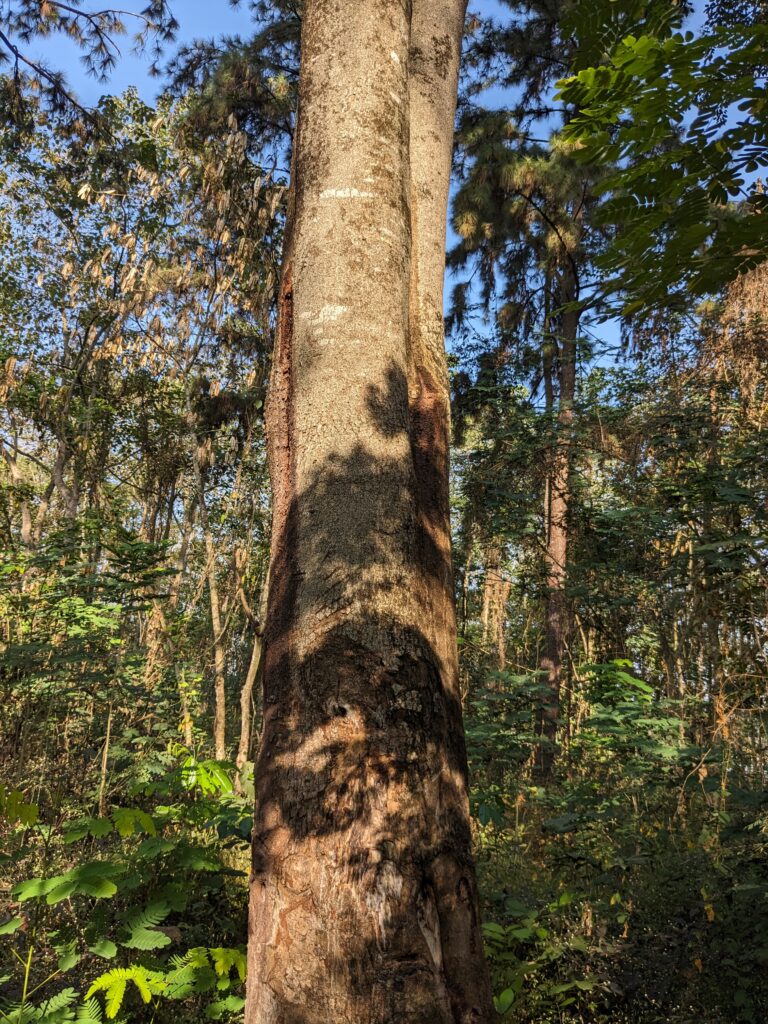
FIJ further learned that that was not an isolated incident. Iromini conducted our reporter on a tour of the forest in December. The forest is indeed home to diverse trees, some of which have become endangered. Specifically, the forest has two African teaks, also called iroko: a giant one and a small one. Yoruba culture reveres iroko trees for their medicinal, financial and spiritual importance, among others. According to the International Union for Conservation of Nature and Natural Resources (IUCN), iroko is now close to extinction due to unsustainable exploitation. It is now on the IUCN list of threatened species.
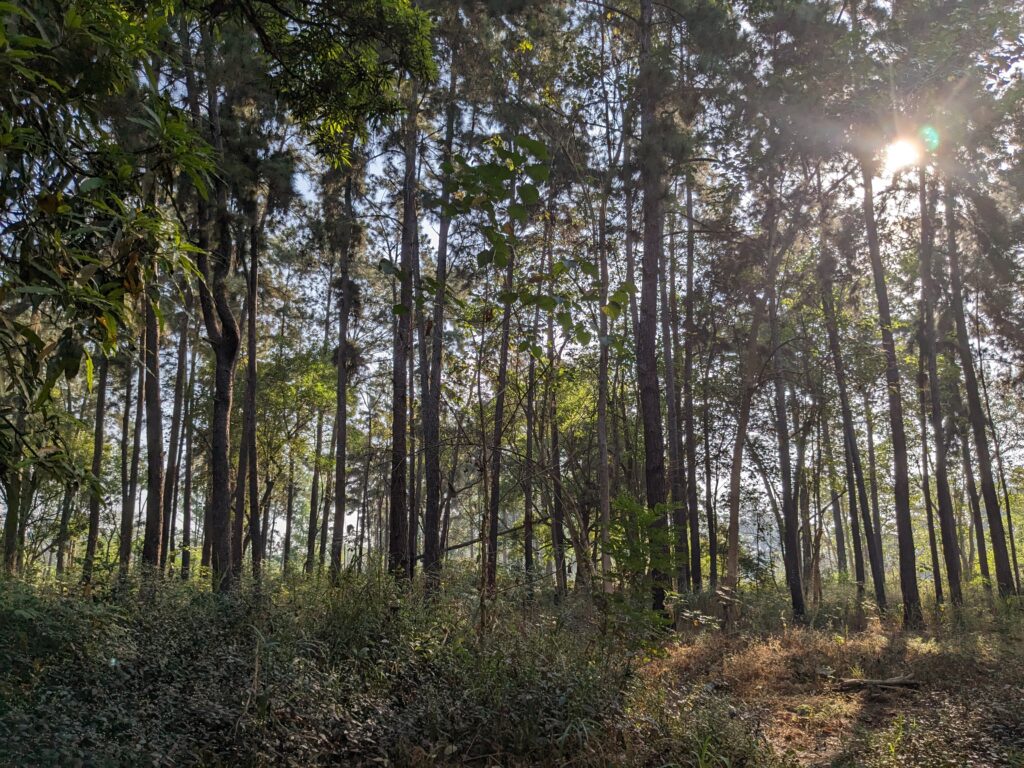
“These are iroko trees. You don’t find them everywhere,” Iromini said. Pointing to one, he said, “This big one is the mother of the small one.” Both trees are about 15 metres apart. While high-rise eucalyptus trees are the major tree species in the forest, there are others, such as cassia trees, teak and gmelina trees. Eucalyptus trees have a robust ability to withstand temperature change, yet they are vulnerable to climate change extremes, according to a research by Ecology and Evolution.
Proper forest conservation is at the core of climate change action. Over 140 countries pledged $19 billion in funding at the 26th edition of the Conference of the Parties known as COP26 to end deforestation by 2030. Nigeria was one of the countries committed to ending deforestation. Failure to prioritise the welfare of essential workers such as Iromini makes mockery of those lofty commitments.
An email FIJ sent to the environment ministry on January 3 and a follow-up on Wednesday had not been responded to at press time.
Subscribe
Be the first to receive special investigative reports and features in your inbox.


